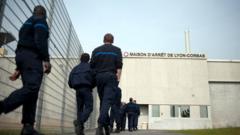As Pope Leo XIV assumes leadership of the Catholic Church, his past handling of sexual abuse allegations reveals contrasting approaches that will significantly influence the church's efforts to restore trust among its followers.
Scrutiny of Pope Leo XIV: A Mixed Legacy on Sex Abuse Matters

Scrutiny of Pope Leo XIV: A Mixed Legacy on Sex Abuse Matters
Investigative findings examine Pope Leo XIV's dual approach to handling sexual abuse cases during his tenure as bishop in Peru.
Sexual abuse scandals have long plagued the Catholic Church, with allegations against priests creating significant challenges to its reputation and moral authority. As Pope Leo XIV steps into his role as head of the 1.4 billion Catholics worldwide, his past actions regarding abuse cases are under intense scrutiny and will shape the Church's future restoration efforts.
A recent investigation by a team of reporters provided insights into Leo's tenure as Bishop Robert Prevost in Chiclayo, Peru, from 2015 to 2023, highlighting two notable cases that exhibit starkly contrasting responses to allegations of abuse. In one instance, Bishop Prevost took a strong stand for victims, confronting influential Church figures to advocate for justice. This case involved the Sodalitium Christianae Vitae, a controversial Catholic movement known for its abusive practices that targeted the children of wealthy families.
Conversely, in another case, Leo faced criticism for an inadequate investigation into claims made by three women who alleged they've suffered abuse at the hands of priests during their childhood. The investigation uncovered troubling details, including reports that accused priests remained in ministry, sometimes engaging with minors while investigations were ongoing. Additionally, a pastoral counselor appointed by Bishop Prevost reportedly discouraged victims by suggesting their experiences did not constitute "rape," indicating a lack of accountability on the Church's part.
These revelations raise pressing concerns about how Pope Leo XIV's past actions might reflect broader institutional failures and affect the Church's ability to forge a path towards healing and accountability as it confronts its legacy of abuse.






















